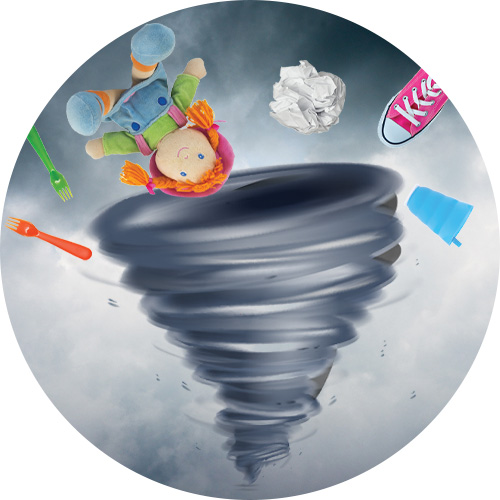I of the Storm: Chapter 2

Why can’t Shira be like all other kids?

One hour to candlelighting.
I sprinkled the crumb topping on my apple cobbler, threw it in the oven, and looked around. Way to go. Challah, fish, chicken, three sides, and really cool dessert.
We were hosting four 17-year-olds for Shabbos, and I was excited. Living out of town, we don’t get sleepover guests much. So when the principal of my New York alma mater asked me to host for the 12th grade convention, I was thrilled.
A knock on the door, a flurry of hellos, a quick round of Jewish geography. I offered cold drinks, plates of piping hot potato kugel, and began walking the girls to their room. Picture-perfect, Martha-Stewart hosting. And then Shira emerged.
“Why do you have a red dot on your nose?” she asked a gangly girl whose face was mottled with acne. The group tittered politely.
“Shira, let’s let the girls get ready for Shabbos,” I said, shooting a firm, now’s-not-the-time-to-be-cute look.
Firm Look failed. Three minutes later, I heard banging on the guests’ door. “What’s taking so long? When are you coming out?” Shira hollered. Before I could intervene, she opened the door a crack.
Deep breath, I told myself. You aren’t meant to show these girls an idyllic, wholly unrealistic snapshot of young family life. Just handle this calmly, and teach them what it means to be a mother.
A voice shot back. But it’s so embarrassing!
I set Shira up with some Playstix (“Make me a surprise!”) and, two consecutive sibling squabbles notwithstanding, quiet prevailed.
But after Daniel headed for shul and we sat down on the couch, I found I could not get a word out. Shira was a Mexican jumping bean on steroids: She hugged the girls incessantly, demanded they play games with her, and refused to let anyone talk.
“Remind me your last name—”
“MOMMMEEEEE! You NEED to play with me NOW!”
I capitulated, flashing an apologetic look to my guests. One girl widened her eyes and glanced at her friend, as if to say, Ever seen something like this?
The seudah — similarly disastrous. The twins happily sung zemiros with Daniel, then trotted off to the den. Ari gurgled from his bouncer. But an hour into the meal, Shira still dominated the room, cutting into conversations and doing weird antics.
“Shira, please stop mushing the carrots all over the tablecloth.”
A snicker.
“Shira, please do not touch every piece of chicken on the platter.”
“Shira, you may not sit on the table.”
“But I LIKE SITTING ON THE TABLE!”
Crash. One candlestick nosedived to the floor, its glass candle cup smashing into smithereens. My equilibrium went with it.
“No more guests for us,” I told Daniel bitterly that night. “At least for ten years.”
I knew I should grow up and accept that there’s a time for everything. But I loved company, and, yes, I was resentful. Aargh! Why couldn’t Shira just be like all other kids?
Two months later we gathered the courage to host again — this time an older single friend, a child psychologist. Daniel was apprehensive. “I think she’ll handle Shira,” I reassured him. “She does this for a living.”
Thankfully, I was right. Alyssa knew just what to say and do, preempting flare-ups and making Shira beam. We didn’t get to talk much, but at least I wasn’t navigating a violently swinging tightrope.
“Ilana, are you getting help for Shira — and yourself?” Alyssa asked gently after Shalosh Seudos. From anyone else, it would have been an intrusive, presumptuous question. Surprisingly, though, I felt no defensiveness. Just relief.
“She’s not your typical kid, right?”
“No,” Alyssa said. “She shows signs of sensory issues, possibly also ADHD. But with the right intervention, she can become a lot more manageable.”
I found myself tearing up. I wasn’t crazy. I wasn’t overreacting. Most importantly — I wasn’t the reason Shira was acting this way. An objective professional was advising me to get help.
I felt the guilt — and shame — start to melt.
We’d get Shira help, we’d invest time and energy and money. We’d work to become more effective parents. We’d still face mortifying, infuriating moments, but once we could define and tackle the challenge, maybe the rage would be tempered by empowerment.
I’d known the answer before, but only now was I starting to really believe it.
Why can’t Shira be like all other kids?
Because this is the way Hashem made her.
And like it or not, our job is to help her through.
(Originally featured in Family First, Issue 468)
Oops! We could not locate your form.


